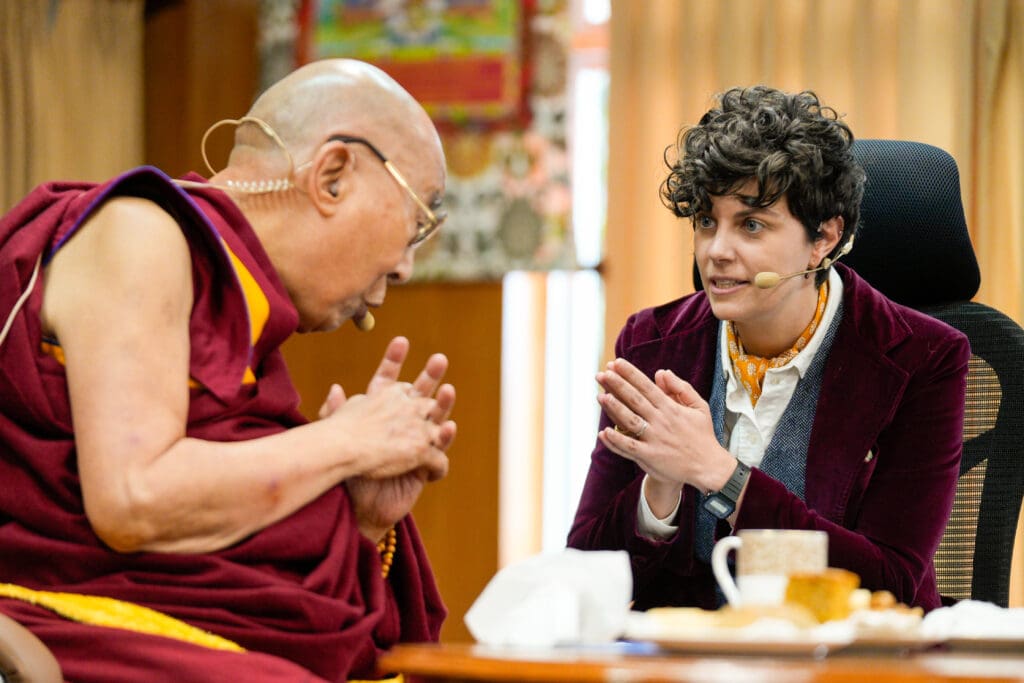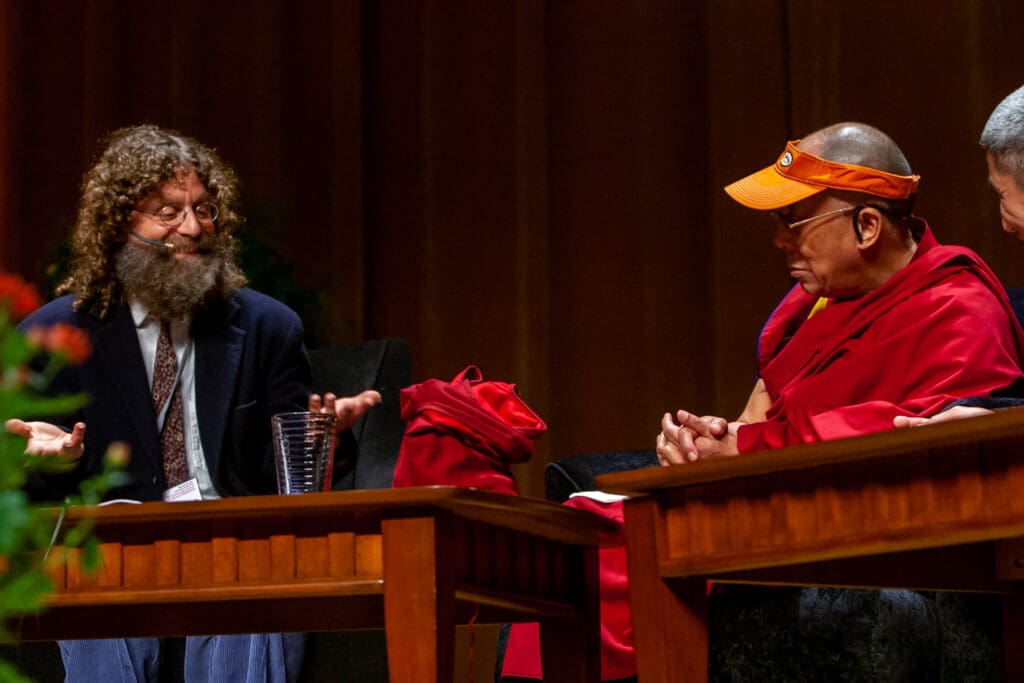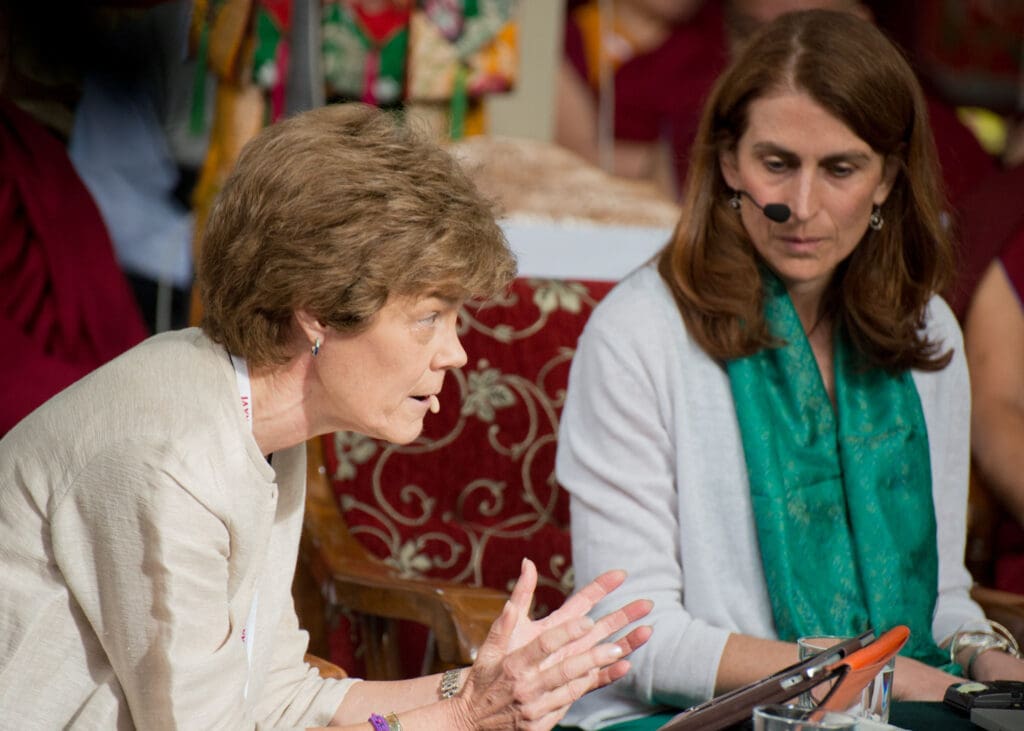
The Dalai Lama has long implored humans to move beyond conflict and wars, calling for the 21st century to be one of dialogue. Twenty-three years into the century, it’s clear we have a long way to go. Violent conflict continues to be a defining characteristic of our age. What’s more, the digital media landscape has made it far easier for people to dwell within online echo chambers, where one-sided views are validated in the absence of meaningful discourse.
What does real dialogue look and feel like? And how could it help expand possibilities for deeper understanding at a time of growing complexity—and mounting divides? One need go no further than Mind & Life’s new Digital Library to find out. The Library catalogs and makes available video recordings of Mind & Life Dialogues and Conversations hosted between the Dalai Lama and leading scientists, philosophers, contemplatives, and other ‘big picture’ thinkers.
While the Dialogues date back more than 35 years, the themes—from the impact of meditation on the mind to the source of craving and desire—are evergreen. Visitors can choose to learn about the benefits of meditation for coping with chronic disease and the use of mindfulness for addiction, among other topics.
Yet beyond the content discussed is the form the Dialogues take. “The Dialogues are inherently optimistic and pro-social,” says Ryan Stagg, Mind & Life Director of Digital Strategy. “There’s an intrinsic belief that there’s something we can learn from each other.” The practice of leaning in to understand others can be thought of as a form of embodied relationality, he adds.
The Dialogues are inherently optimistic and pro-social.
There’s an intrinsic belief that there’s something
we can learn from each other.
The Dialogues trace the evolution of the field of contemplative science. Participants grapple in real-time with unresolved questions (i.e., What is the mind?), share findings, and discuss applications. In the late 1980s and 1990s when the Dialogues first emerged, this coming together of science and spirituality was revolutionary.
“One comes away with a profound recognition of the complexity of this interdisciplinary effort,” says Mind & Life Creative Content Producer Phil Walker. “You meet people—philosophers, anthropologists, neuroscientists—doing original research in a field that didn’t exist yet.”
The Library currently houses content dating back to 2005 with Dialogue XIII on “Investigating the Mind: The Science and Clinical Applications of Meditation.” Held in Washington, DC, the event featured luminaries such as Richie Davidson, Roshi Joan Halifax, Father Thomas Keating, Jon Kabat-Zinn, Matthieu Ricard, Sharon Salzberg, Wolf Singer, and Robert Sapolsky, among others.

In praise of contemplative practice as a profound way of knowing, Father Keating shared, “The sense of relating to ultimate reality is the ultimate source of security, love, and freedom… It forms a kind of fourth dimension of the three dimensional world we live in.” Just as the purpose of religion is to bring people closer into that space, so too, could this be the purpose of medicine, he added.
Other events chronicled in the Library include Dialogue XXVI: Mind, Brain, and Matter: Critical Conversations Between Buddhist Thought and Science (2013) held in Mundgod, India, and Dialogue XVII: Craving, Desire, and Addiction (2013), hosted in Dharamsala, India. The most recent addition is a 2022 Mind & Life Conversation on Interdependence, Ethics, and Social Networks, also held in Dharamsala.

Who is the Library for? It was created for anyone with an interest in the art of dialogue, the field of contemplative science, and/or questions at the heart of the human experience. That includes students, scholars, scientists, contemplatives, and change-makers around the globe.
The online Library was constructed to facilitate ease of use and research. Visitors can search transcripts of each Dialogue, using keywords, thereby saving hours of viewing time. For those averse to screens, it’s possible to download audio files to listen to on a walk, or transcripts to read in your favorite chair.
In the spirit of the Dialogues, the Library is being made available free-of-charge as an open access knowledge repository, with new content added on an ongoing basis.
Mind & Life gratefully acknowledges the generous contributions of The Gaden Phodrang Foundation of the Dalai Lama, the Hershey Family Foundation, and The Morrison Centre in making the Digital Library possible.

